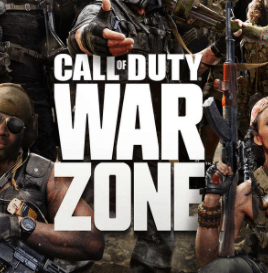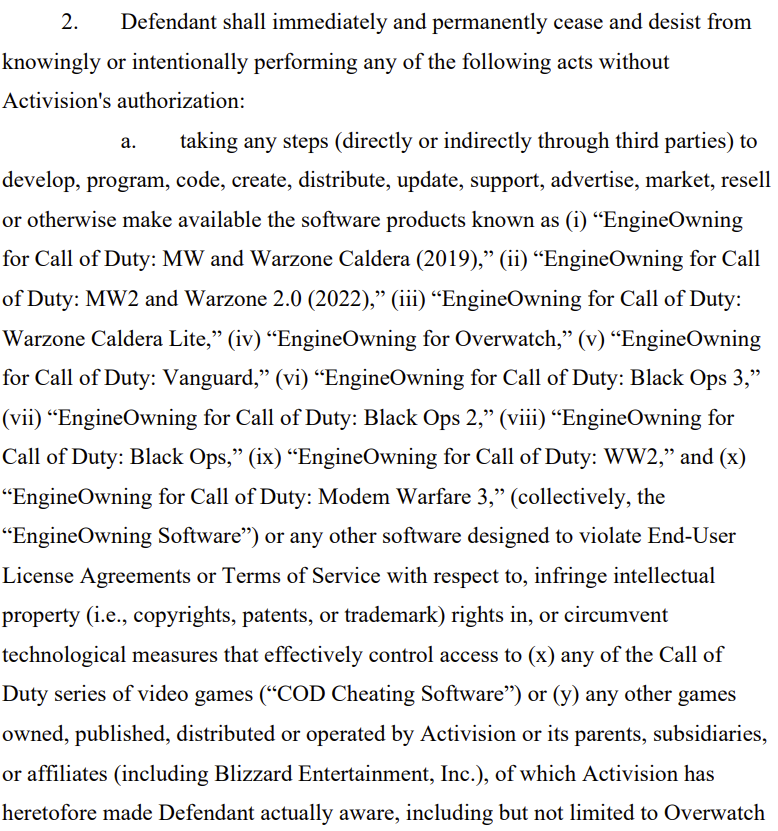Cheating in computer games has existed almost as long as gaming itself. The difference today is that single-player games have mostly given way to multiplayer experiences featuring human competition.
Poking around in 8-bit gaming code was something enjoyed in isolation. Deploying a commercial cheating product to ensure ‘victory’ in a multi-player environment is something else entirely.
Activision vs. Call of Duty Cheat-Makers
Activision is among several companies leveraging copyright law to send a message to cheat-makers. A lawsuit filed early January 2022 in the U.S. targets German companies EngineOwning UG and CMN Holdings S.A, plus a growing list of both named and yet-to-be-identified defendants.
EngineOwning UG and ten named defendants filed a 53-page motion to dismiss last month, characterizing the lawsuit as a battle between a $50 billion dollar company and mostly overseas defendants with limited resources to fight back. Two of those defendants, EngineOwning UG and Valentin Rick, are already being sued by Activision in a similar lawsuit in Germany.
In broad terms, appeals to dismiss the U.S. lawsuit center on Activision’s decision to sue foreign defendants, with limited ties to the United States, in a California court. Germany would be a more appropriate and ultimately more practical venue, the motion argues.
Germany has competent courts, meaning the defendants wouldn’t have to incur huge costs to defend the same actions thousands of miles away. And since Activision has offices in Germany, a local proceeding shouldn’t be a burden for the plaintiffs either, the defendants insist.
A decision in the German case is expected to arrive soon and according to the defendants, it will be resolved “one way or another.”
Two Defendants Decide to Settle
With the prospect of potentially prolonged legal action ahead, two of the named defendants in the United States action have reached agreements with Activision.
In two separate filings dated February 14, Activision and defendants Ignacio Gayduchenko and Manuel Santiago request entry of consent judgments to bring their respective matters to an end.
In broad terms, both defendants have agreed to permanently cease and desist from knowingly or intentionally performing any of the activities detailed in a comprehensive list. The image below contains a small sample.
The agreements are customized based on details specific to each individual, their alleged role and other circumstances, but the overall message is extremely clear: stay away from cheat-related behaviors connected in any way to Activision’s business or face the consequences.
Gayduchenko agrees that judgment shall be entered against him “in the amount of two million dollars ($2,000,000), to be due and payable solely pursuant to the terms set forth in the Parties’ Confidential Settlement Agreement and Release.” Manuel Santiago agreed to the same terms but just half of the money – $1,000,000.
“The Parties irrevocably and fully waive any and all rights to appeal this Judgment and Permanent Injunction, to have it vacated or set aside, to seek or obtain a new trial thereon or otherwise to attack in any way, directly or collaterally, its validity or enforceability,” both documents continue.
“Nothing contained in this Judgment and Permanent Injunction shall limit the right of the Parties to seek relief including, without limitation, damages for any and all infringements of any Intellectual Property rights or for violation of the anti-circumvention provisions of the DMCA occurring after the date of this
Judgment and Permanent Injunction.”
Entry of these judgments and permanent injunctions require the judge’s signature, but for defendant Katerina Disdle, things are more straightforward. On February 10, Activision voluntarily dismissed her from the case. The reasons for that are unknown but since the dismissal is without prejudice, Activision has left the door open for further action, if that’s ever required.
Judge Warns Remaining Defendants
When regular people represent themselves in complex legal battles against rich opposition and then win, people make movies about them. The other cases where most lose? Not so much.
A self-representation order placed on file by District Judge Michael W. Fitzgerald notes that one or more defendants in this matter intend to appear without an attorney. That’s completely within their rights but since proceeding pro se has significant risks, a few should be pointed out.
“Generally speaking, non-attorney litigants are less like to be victorious than those assisted by counsel. The opposing party may have a lawyer, and that lawyer’s duty is to achieve victory for his or her client. He or she will take every step legally permissible to that end,” the Judge warns.
“The Court is a neutral adjudicator of the law. The role of the judge is to resolve disputes arising between the parties in accordance with the law. As such, the judge cannot assist you, cannot answer your legal questions, and cannot take sides in the dispute, nor can any members of the judge’s staff.”
Simply stated, when you elect to proceed pro se, you are on your own and become personally responsible for litigating your action in accordance with the rules. You must become familiar with these rules. You will be held to the same standards as a lawyer as far as complying with the Court procedures and the rules and regulations of the court system
The next few pages in the order cover some of the basics (pdf) but since much more is required, additional defendants may be persuaded to settle.
The proposed joint stipulations and voluntary dismissal can be found here (1,2,3, pdf)







